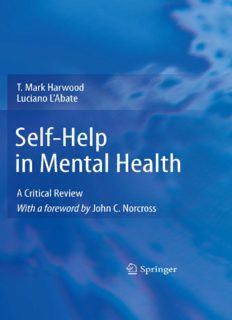Table Of ContentSelf-Help in Mental Health
·
T. Mark Harwood Luciano L’Abate
Self-Help in Mental Health
A Critical Review
123
T.MarkHarwood LucianoL’Abate
DirectorofClinicalTraining GeorgiaStateUniversity
AssociateProfessorofClinicalPsychology DepartmentofPsychology
WheatonCollege 33GilmerStreet
PsychologyDepartment Atlanta,GA30303-3082
Wheaton,IL60185 USA
USA
ISBN978-1-4419-1098-1 e-ISBN978-1-4419-1099-8
DOI10.1007/978-1-4419-1099-8
SpringerNewYorkDordrechtHeidelbergLondon
LibraryofCongressControlNumber:2009935053
©SpringerScience+BusinessMedia,LLC2010
Allrightsreserved.Thisworkmaynotbetranslatedorcopiedinwholeorinpartwithoutthewritten
permission of the publisher (Springer Science+Business Media, LLC, 233 Spring Street, New York,
NY10013,USA),exceptforbriefexcerptsinconnectionwithreviewsorscholarlyanalysis.Usein
connectionwithanyformofinformationstorageandretrieval,electronicadaptation,computersoftware,
orbysimilarordissimilarmethodologynowknownorhereafterdevelopedisforbidden.
Theuseinthispublicationoftradenames,trademarks,servicemarks,andsimilarterms,eveniftheyare
notidentifiedassuch,isnottobetakenasanexpressionofopinionastowhetherornottheyaresubject
toproprietaryrights.
Printedonacid-freepaper
SpringerispartofSpringerScience+BusinessMedia(www.springer.com)
InmemoryofDr.ThomasR.Harwood,M.D.:A
consummatephysician,manofintegrity,and
wonderfulfather.Imissyoueveryday.
TothememoryofAlmaZaccaroL’Abateand
GiovanniL’Abateforprovidingmewithwhatever
motivation Ihavereceivedto“fareunabella
figura,” andtointroducemetotheimportant
valuesofmylife,mymusic,andmyWaldensian
heritage“Luxlucetintenebris.”
Foreword
Self-help is big business, but alas not a scientific business. The estimated 10
billion—that’switha“b”—spenteachyearonself-helpintheUnitedStatesisrarely
guidedbyresearchormonitoredbymentalhealthprofessionals.Instead,marketing
andmetaphysicstriumph.Themoreoutrageousthe“miraculouscure”andthe“rev-
olutionarysecret,”thebetterthesales.Ofthe3,000plusself-helpbookspublished
eachyear,onlyadozencontaincontrolledresearchdocumentingtheireffectiveness
asstand-aloneself-help.Ofthe20,000pluspsychologicalandrelationshipwebsites
available on the Internet, only a couple hundred meet professional standards for
accuracyandbalance.Most,infact,sellacommercialproduct.
Pity the layperson, or for that matter, the practitioner, trying to navigate the
self-helpmorass.Wearebombardedwiththousandsofpotentialresourcesandcon-
tradictory advice. Should we seek wisdom in a self-help book, an online site, a
12-stepgroup,anengagingautobiography,atreatmentmanual,aninspiringmovie,
or distance writing? Should we just do it, or just say no? Work toward change or
accept what is? Love your inner child or grow out of your Peter Pan? I become
confusedanddiscouragedjustcontemplatingthechoices.
Makenomistake:Self-helpcanhurtaswellasheal.Ourresearchindicatesthat
10% of self-help resources are rated as harmful by clinical psychologists familiar
with them. When scientifically dubious material is marketed to vulnerable peo-
ple struggling with painful disorders, harm can and does occur. Such materials
maywastetheirtimeandmoney.Suchmaterialsmaydissuadethemfromseeking
moreeffectiveandproventreatments.Such“guaranteedsuccesses”mayhavepeo-
ple blaming themselves for their disorders and thwarting future efforts to recover.
And,ofcourse,harmfulandevenbenignself-helpmaterialstarnishthecredibilityof
mentalhealthprofessionals,asfewlaypersonscanaccuratelydifferentiatebetween
professionaltreatmentandself-helpnonsense.
Howmighttheresponsiblepractitionerreconcilethepowerandubiquityofself-
help, on the one hand, with its unregulated, Byzantine, and potentially harmful
nature, on the other? By turning to Drs. Harwood and L’Abate’s The Self-help
Movement in Mental Health: A Critical Evaluation. These distinguished authors
provide trenchant evaluations of the self-help literature, organize the morass into
meaningful parts, and offer evidence-based self-support resources. The authors
vii
viii Foreword
also tackle the thorny question of when self-help might prove unhelpful or
contraindicated.
MarkHarwoodandLucianoL’Abatetenderacornucopiaofresearch-supported
self-helpinitiated,guided,maintained,ormonitoredbyprofessionals.Theyaddress
bibliotherapy, distance writing online, support groups, health-related newsletters,
andmoreforspecificclinicaldisorders—anxiety,depression,addiction,eatingdis-
turbances,andpersonalitydisorders,amongthem.Somethingusefulforeveryclient
orconsumertotry;somethingpracticalforeverypractitionertorecommend.
The self-help revolution is here and it is growing. More people this year will
readaself-helpbook,attenda12-stepgroup,orobtainpsychologicaladvicefrom
theInternetthanreceivetreatmentfromallspecializedmentalhealthprofessionals
combined. Self-help is the major pathway to behavior change; self-help is the de
facto treatment for most behavioral disorders. I implore you to use this book to
select and harness self-help for the benefit of our patients and the populace. We
professionals,byourbehavior,cansignificantlyenhancetheeffectivenessandsafety
ofself-help.
JohnC.Norcross
Preface
This book aims to review the self-help (SH) movement in mental health (MH)
through empirically based approaches in health promotion, prevention of illness,
psychotherapy, and rehabilitation. Mental health is a vast field composed of mul-
tifarious aspects, including SH approaches that are self-administered or that can
beadministeredbyprofessionals,middle-levelprofessionals,aswellasvolunteers.
Thisreviewisconductedfromanempiricalstandpoint,thatis,howvalidandreli-
able are claims made by advocates and supporters of this movement? What is the
empirical evidence for SH? The basic question toanswer inthisreview would be,
How helpful is SH? Specifically: If it is helpful, under what conditions and with
whomisithelpful?Whenmightself-helpnotbehelpful?Whenmightself-helpbe
contraindicated?
At this time, there are over 1400 entries in cross-indexing SH and MH in the
PsycINFO search engine, enough information to review and to be condensed in
the various chapters of this book. Even though there are many books published in
this field, there is no comprehensive work that covers the field in the way (empir-
ical evidence) this volume does, except for Norcross et al. (2000), where little
attention was paid to empirical evidence. His paper (Norcross, 2006), however,
brings up-to-date the literature on SH strictly in psychotherapy and not the entire
MH field. Nonetheless, his suggestion to use films and self-help books as ancil-
larysourcesinpsychotherapydidnotprovideanyoutcomeevidencebecausethese
sourceswerenotsubjectedtoanyempiricalverification.Hence,hissuggestionwas
impressionisticandinneedofverification.
Among related secondary references available in the field SH in MH are
(1) Clay, Schell, Corrigan, and Ralph (2005); (2) Kirk (2005); (3) Maheu et al.
(2005);(4)Ritchieetal.(2006);and(5)Latner&Wilson(2007).Somesourcesare
actuallycriticallynegativeoftheSHmovement(Salerno,2005).
Part I of this book contains three chapters. Chapter 1 defines various levels of
SHand thetwomeanings ofMHasapersonalcondition and asadisciplineinits
various applications. Chapter 2 includes the various levels of involvement in SH
activities, from watching movies and reading to more active and even interactive
activities, including advances that have taken place in the field of MH during the
lastgeneration,withtheadventoftheInternet,withitsmanyimplicationsforSH,
ix
x Preface
theinclusionoflow-costapproaches,andtheincreasinguseofwritinginhomework
assignments.
PartIIcontainsalltheSelf-Support(SS)approachesthatareinitiatedandmain-
tainedbyparticipantsthemselveswithinarangeofhelpfromminimalornohelpto
regularinteractionsfromexternalhelpers.Theseapproachesincludedistancewrit-
ing in Chapter 3 that supports the position that distance writing will become the
majormediumofSHcommunicationandhealinginthiscomingcentury.Thelarge
field of bibliotherapy in Chapter 4 indicates how important this field is to the SH
field.Chapter5coverstheburgeoningfieldofonlinemutualgroupsandindividual
therapy.Chapter6coverstheuseofmanualsforpractitioners.
Part III includes approaches for Self-Change (SC), as distinguished from SH,
that are initiated, administered, guided, maintained, and monitored by profes-
sionals, various levels of semi-professionals, and volunteers for particular condi-
tions, including Anxieties (Chapter 7), Depressions (Chapter 8), Eating Disorders
(Chapter 9), Addictions (Chapter 10), Personality Disorders (Chapter 11), Severe
Psychopathology(Chapter12),andmiscellaneousmedicalconditions(Chapter13).
InPartIV,onthebasisofalltheevidencereviewedinallthepreviouschapters,
(Chapter 14), we outline relational competence theory that we think may answer
some questions about who does and who does not benefit by SH and by SC. We
close with a paradigm for SH in MH interventions based on a stepped approach,
self-help first, talk second, medication, and hospitalization third, from the least to
themostexpensiveapproach.
The primary and direct audience for this work is mental health professionals,
includingpolicymakersatthefederalandstatelevels,aswellasgraduatestudents
in most mental health disciplines and graduate training programs in health educa-
tion, prevention, psychotherapy, clinical psychology, couples and family therapy,
psychiatricnursing,psychotherapists,religiousandschoolcounseling,socialwork,
andpsychiatry.
Wheaton,IL,USA T.MarkHarwood
Atlanta,GA,USA LucianoL’Abate
Acknowledgments
We are grateful to the substantial contribution made by doctoral student, Sarah
Griffeth, M.A. Without Sarah’s expert help with resources and organization, the
qualityofthisworkwouldhavebeencompromised.
xi
Description:They’re fast, cheap, and promise amazing results—no wonder more people seek mental health advice from self-help books and sites rather than seeking therapy. Complicating this picture: many resources are inappropriate, ineffective, even dangerous. For the clinicians who would gladly recommend sel

